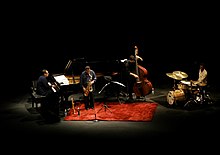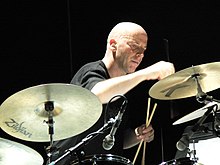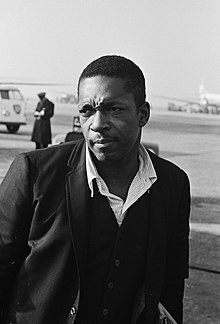Scandal (album)
| Scandal | ||||
|---|---|---|---|---|
| Studio album by Dave Douglas & Joe Lovano Sound Prints | ||||
|
Publication |
||||
| Label (s) | Greenleaf Music | |||
|
Format (s) |
CD |
|||
|
Title (number) |
11 |
|||
|
running time |
66:32 |
|||
| occupation | ||||
|
Studio (s) |
Bunker Studios, Brooklyn, New York City |
|||
|
||||
Scandal is the second album by the Sound Prints formation around trumpeter Dave Douglas and saxophonist Joe Lovano . It was recorded on September 4, 2017 at Bunker Studios, Brooklyn and was released on April 6, 2018 on the Greenleaf Music label. The album received consistently positive reviews; the Italian edition of All About Jazz gave him 4½ stars; Jazziz magazine included the production in the list of the best albums of 2018.
background
Sound Prints , the quintet of Joe Lovano and Dave Douglas with Lawrence Fields (piano), Linda Oh (double bass) and Joey Baron (drums) performed at the Monterey Jazz Festival in California on September 21, 2013 ; the recording was released on Blue Note Records . In a press release, Dave Douglas explained the reasons for the title of Sound Prints' second album, Scandal . “We don't play according to the traditional rules of jazz or those taught in school. In today's increasingly unpredictable climate, it is scandalous to 'question everything about the assumptions of improvisation', an activity that 'has become too rare and risky' ". Dave Douglas, Joe Lovano, accompanied by a rhythm section made up of Joey Baron, Lawrence Fields and Linda May Han Oh , pay homage to Wayne Shorter with this production ; its influence can be seen both thematically and spiritually in the program of the recording, which (in addition to the original compositions of the two band leaders) contains the remakes of two important Shorter compositions, "Juju" (from the album of the same name from 1964) and "Fee Fi Fo Fum ”(from Speak No Evil , 1966), the latter being given free processing.
The kick-off of the album is Douglas' "Dream State", a play in 5/4 meter , the Groove a sharp, from the Gospel supported influenced motif that is carried forward from the Horn Alliance. The quintet is in Lovano's “High Noon” which is an up-tempo number, and “The Corner Tavern” has a calypso- like groove in which the horns exchange improvised lines with nervous movements and logical sequences. “Full Sun” and “Full Moon” are in contrast to each other in sound and essence, as the former, in contrast to the lyrical, spacious and questioning latter, is a lively post-bop ride, which is typically structured with flexible bass, saxophone and trumpet solos is.

Track list
- Joe Lovano & Dave Douglas: Sound Prints - Scandal (Greenleaf Music - GRE-CD-1063)
- Dream State (Douglas) 5:36
- Full Sun (Lovano) 5:06
- Fee Fi Fo Fum (Wayne Shorter) 6:03
- Ups and Downs (Douglas) 6:57
- The Corner Tavern (Lovano) 6:50
- Scandal (Douglas) 5:51
- Juju (Wayne Shorter) 9:05
- Mission Creep (Douglas) 6:18
- Full Moon (Lovano) 8:06
- High Noon (Lovano) 2:26
- Libra (Douglas) 4:16
In January 2020 Greenleaf Music released 3 bonus tracks for download at bandcamp.com
- That-A-Way Piscataway (Douglas) 5:53
- Newark Flash (Lovano) 5:28
- Mission Creep (Douglas) 7:21
They are not included on the CD, but can be downloaded from bandcamp, also at a later date (see web links).
reception
Jeff Tamarkin wrote in JazzTimes that the musicians admittedly insisted on throwing expectations out the window. Whether it goes so far that it can be described as “scandalous” is, however, questionable, but it definitely ensures exciting jazz. The "incessant eagerness to discover that characterizes Shorter's career" is a trademark of Scandal - as in the rickety, almost comical horn conversation that Lovano's "The Corner Tavern" dominates; the juxtaposition of Fields' delicate solo with the carefree, bouncy rhythm of “Dream State” and the nervous tempo of “High Noon”. "But somehow it's really very comforting, all this tension and surprise," Tamarkin sums up. "If this is a scandal , we'll be covering it on the news every day."
John Fordham ( The Guardian ) praised that the Sound Prints quintet could certainly reserve its place in the lineup of the nest jazz albums of 2018, “thanks to the smoldering, Miles [Davis-esque] muffled trumpet sound and the hip, but stately horn counterpoint of his title piece ”. For some, it may be a disadvantage of Scandal that it is a jazz album that is fully instrumentalized in terms of the accuracy of its fascination with Wayne Shorter's music, the writer says, particularly with regard to Shorter's work in the 1960s -Years and his participation in Miles Davis ' second quintet. But the group around Lovano and Douglas, which existed for five years at the time of the recording, told "from this perspective better jazz stories than most others and this session captures them in the collective flow".
The bandleaders would have hoped that this session could help “celebrate unity in separate times,” Fordham continued, “a common contemporary goal, but the reflexivity and empathy of this band celebrate unity on almost every track.” Douglas 'and Lovano contrapuntal game about Linda Oh's agile bass line and Fields' unobtrusive, dissonant chords were "models of the exact, but resilient group thematic playing on the sluggish vibrant dream state." the "enthusiasm for newly invented bebop " show according to the author in the lively title "Full Sun" and the Latin Swing from "The Corner Tavern". The two Shorter cover versions - "Fee Fi Fo Fum" and "Juju" - featured an ambiguous version of Shorter's sharply swinging original in Douglas' arrangement and a mixture of confusing piano and percussion figures and terse trumpet and saxophone solos in Lovano's version of the latter . The title track “Scandal” is a tour de force for Lovano - “a dreaming” of murmuring paired tones and wistful trumpet-saxophone dialogues that “gracefully transform into slow jazz grooves and in the Miles Davis / Wayne Shorter manner be enticed by Linda Oh's attentive bass lines and Fields' gently pressing piano. ”This is“ jazz with a deep sense of history, ”summarizes Fordham,“ but which has been imaginatively and spontaneously reworked. ”
Mike Collins ( London Jazz News ) said the inspiration they get from Shorter is "to follow his open-minded exploratory approach in a small band rather than directly emulating it." Douglas and Lovano each have many admirers of their own; therefore it is exciting to hear how they concentrate their creative powers on this joint venture . This studio album has the feel of a live performance; "Douglas' trumpet and Lovano's saxophone chase each other and wind their way across every track."
Concerning the two shorter classics, Collins notes that “Fee Fi Fo Fum” (arranged by Douglas) begins with a reference to the classic riff , dissolves in a trumpet and saxophone tournament, breaks into a fleeting piano solo over driving swing off, switching to the topic, pausing for inflammatory, collective reflection before setting off again. Joey Baron begins a staggering, reflective take on the “JuJu” arranged by Lovano, which is played after the beat for a large part of the piece, “fragments of the melody that were declaimed before the hectic exploration together, then a small, motivic hook ignites a groove and Fields breaks out on the piano. It's exciting to do a tightrope act . ”This band set out to play their music with the same attitude as Shorter, Collins concludes, and they certainly do. This is "acoustic jazz for small bands at its best."
John Murph wrote on Down Beat that Wayne Shorter was still the focal point of the couple for the second release by Joe Lovano and Dave Douglas as Sound Prints . As with their Blue Note Records debut in 2015, the two take over the spatial awareness that Shorter's current quartet has praised and enliven the interaction and the overarching dialogue. Lovano and Douglas also projected their own strong artistic voices. “Both in terms of sound and improvisation, the two offer fascinating contrasting and complementary sensations. Lovano's cobalt blue tone on the tenor saxophone paired with Douglas' crimson trumpet torches create amazing timbres when they play in unison or interweave improvisational lines. It is the latter that they are most concerned with. Your passages tend to buzz around each other like sparring partners . "
The reviewer also goes into the performance of the rhythm section; In his opinion, “the fragmented rhythms of drummer Joey Baron and the colossal bass lines of Linda May Han Oh [...] enhanced the leaders' performances with great rubato speed and elastic cohesion, while the calligraphic accompaniments of pianist Lawrence Fields provided the right one A lot of harmonic and melodic thrusts. ”In addition to Shorter's Eiunfkuss, the author also sees traces of John Coltrane's compositions; so play the descending opening melody of Scandal on “ Naima ” from 1959, before the piece unfolds in unexpected directions. Under the jagged and headstrong melody of “High Noon”, in Murph's opinion, “faint hints of the skipping melody of ' Giant Steps '” are hidden . However, these references to Shorter and Coltrane did not detract from the brilliance of the originals, says the author. Douglas' great ballad "Ups and Downs" with its distinctive lyric poetry and Lovano's lively "The Corner Tavern", which contains wonderful trumpet passages by Douglas, are two originals with great potential to become future jazz standards .
Web links
- Information about the album at Greenleaf Music
- Information about the bonus tracks at Greenleaf Music
- Note on subsequent download
- Listing of the album on Allmusic (English). Retrieved July 10, 2019.
Individual evidence
- ^ Giuseppe Segala: Joe Lovano, Dave Douglas: Scandal. All About Jazz, April 3, 2018, accessed December 7, 2019 (Italian).
- ↑ Brian Zimmerman: Year in Review: The Best Jazz Albums of 2018. Jazziz, December 11, 2018, accessed December 7, 2019 .
- ↑ Tom Lord : Jazz discography (online)
- ^ A b c Jeff Tamarkin: Joe Lovano & Dave Douglas / Sound Prints: Scandal (Greenleaf). JazzTimes, April 29, 2018, accessed December 7, 2019 .
- ↑ Joe Lovano & Dave Douglas' Sound Prints - Scandal. Jazz Trail, August 2, 2018, accessed December 7, 2019 .
- ↑ Scandal at Discogs
- ^ A b Jazz album of the month review - Joe Lovano and Dave Douglas Sound Prints: Scandal. The Guardian, April 13, 2018, accessed December 7, 2019 .
- ^ A b Mike Collins: Joe Lovano & Dave Douglas Sound Prints - Scandal (Greenleaf Music GRE-CD-1063. CD review by Mike Collins). London Jazz News, May 15, 2018, accessed December 7, 2019 .
- ^ A b John Murph: Joe Lovano & Dave Douglas' Sound Prints: Scandal. Down Beat, June 1, 2018, accessed December 7, 2019 .


